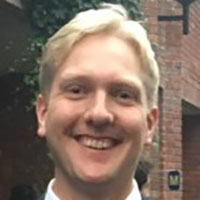Sam Reynolds

Sam Reynolds
Graduated in 2013
MSc Environmental Bioscience in a Changing Climate
First Degree: Biological Sciences
First job after graduating: Internship for NGO Client Earth
Current position (April 2019): PhD, Zoology Department, University of Cambridge
I loved the campus feel of the University, it is a warm community of students and academics. Walking around campus and knowing that everyone there is involved in the University in some way helps to foster this community feeling. This is something that is quite different to where I am currently studying for my PhD.
I enjoyed the taught nature of the course, writing essays and giving presentations on varied areas of environmental science. I enjoyed taking deep dives on different subjects and being guided by academics at the top of their field.
The course really helped me to hone my presentation skills and my ability to produce succinct academic writing. It opened my eyes to areas of science I had not previously considered and emerging global problems that urgently need addressing. Undertaking the Master's course forced me to reconsider my priorities and influenced my future career decisions.
After graduation I undertook an internship at Client Earth, an NGO based in London, working as part of their Sustainable Seafood Coalition. Ultimately achieving our aim to harmonise seafood labelling and how seafood is sourced across the seafood supply chain in the UK. I then worked as an Environmental Consultant for WSP, an international engineering firm. I was the Environment manager on the South East Section of Crossrail and worked on Environmental Impact Assessments for a wide variety of national and international infrastructure projects. I am currently studying for my PhD at the University of Cambridge, based in the Zoology department. I am funded by the BBSRC Doctoral Training Programme. My current research interest is 'Synthetic Ecology', the idea that by manipulating certain components of an ecosystem you can alter the properties of the climax community. In the context of the freshwater ecosystems I am working with, this might allow us to a gain clear water state for improved drinking water sources, move a system towards a lipid rich algal community for biofuel production, or create conditions which are particularly favourable or unfavourable for a threatened or invasive organism.
